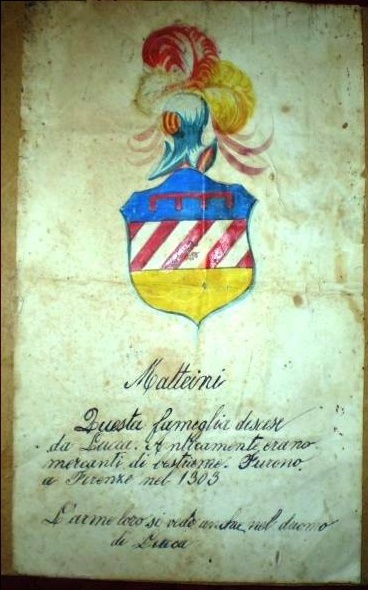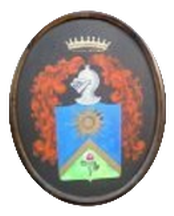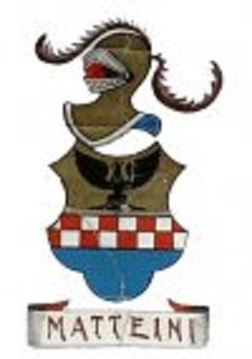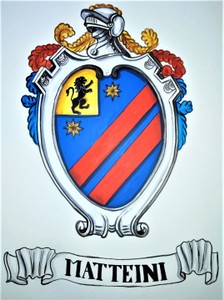- Matteini.org
Main menu:
HERALDRY AND RESEARCHES
In this section there is all the information that we have been able to find during our research.
In particular, you can read the names of the Matteinis we have found in historical archives or published on an online site, and whose genealogical history we want to deepen.
You will also find some coats of arms of branches of the House that we were able to find during our research or that we have received via email from private owners who have allowed us to publish them on our site.

( RESEARCH )
December 2024 Thanks to the valuable contribution received via email from Ivo Matteini, descendant of Guglielmo Matteini who emigrated to Argentina in 1913, who provided us with the data he had regarding his great-
In detail we were able to reconstruct that Guglielmo Matteini, born in Rimini on November 5, 1858, married Giuseppina Macchi, born in 1873, and they had at least three children, before emigrating to Argentina.
In July 1898 Guglielmo left Genoa on the Washington ship headed to Buenos Aires (see registration sheet). In 1913 he also brought his wife Giuseppina and his youngest daughter, Eva, aged 9, to Argentina, leaving two children here in Italy, presumably already settled with their families, Tommaso, born around 1878, and Antonio.
The latter also emigrated to Argentina, with his wife Elvira Gatti. Antonio is Tomas's great-
Guglielmo and Giuseppa, as told by Ivo, had other children in Argentina. To date we do not have their names. We have requested this data from Ivo, we are waiting to receive it.
On the "Images" page you can view the photos of Guglielmo and Giuseppa Matteini kindly provided to us by Ivo.

( RESEARCH )
January 2024 In December 2023 we received an email on info@matteini.org from Antonisio, whom we thank publicly here, whose great-
Antonisio, who lives abroad, congratulates us on the initiative of the site, expressing, I quote "(..) my joy in finding relatives so far away. It is always exciting to discover family ties that cross time and space. (..)"
We cannot deny that this email, in addition to those we already receive, has given us immense pleasure because, in addition to being a clear praise of our research work carried out from 2001 to today, Antonisio informs us that he has a daughter who "will be proud of the history of her ancestors."
Antonisio also informs us in his email, but we already knew this thanks above all to the email we received a few years ago from Humberto Matteini, that there are numerous descendants of Salvatore and Albinia who live in the regions of Espirito Santo and Rio de Janeiro, including, precisely, Humberto and his family, direct descendants of Salvatore and Albinia. Here you can see their Family Tree.
This email, and as already said the others, are for us a further incentive to continue our research work for the goal we set ourselves from the beginning for this site, that is to find and connect all the Matteinis who live in Italy and abroad. A great House.
Thank you Antonisio for your contribution.

( RESEARCH )
February 2024 At the end of January of this year we received an email from Brian, a descendant of Salvatore Matteini who emigrated to the United States at the end of 1800.
In his first contact email (there will then be an exchange of other emails) Brian informs us that his great-
Brian does more.. He sends us a photo of Salvatore's tombstone and that of his first wife, which you can also see in the images section.
Initially, Brian informs us that he does not know the Italian origin of his great-
Not long after, Brian sends us a new email telling us that he has managed to find the marriage certificate of Salvatore with his first wife Giuseppina, discovering that Salvatore was born in CHIUSA SCLAFANI, of which we already have a genealogical branch here on the site.
Continuing to search Brian manages to find the birth certificate of his great-
Analyzing the data that Brian sent us, and comparing them with those in our possession regarding the Chiusa Sclafani branch we also venture a probable relationship since on the birth certificate of Brian's great-
40 years in 1864 brings us to the year of birth of 1824. Genealogically speaking, therefore, assuming that in Chiusa Sclafani at the beginning of 1800 there was not a large presence of Matteinis such that they were NOT related to each other makes us venture the conclusion that Antonino was a close relative of the Salvatore who remained in Italy, the latter born in 1834.
Unfortunately, to date, we are not allowed to personally confirm this hypothesis for reasons strictly related to the distance (Florence -
We will see what we can find soon.
In the meantime, we also thank Brian for his research on site and for having wanted to share it with us by giving us the opportunity to publish it on our site.
Giacomo e Andrea

( RESEARCH )
April 2024 -
In searching for data regarding our branch, we had run aground on the place of origin (read birth) of our great-
Rereading some notes transcribed in my, now inseparable, black diary I found a note regarding the "Tax of the Millstones", a tax now in disuse but which helped us understand in which direction to move to find any birth certificates of our great-
It is important to know that the millstone tax was a tax that was paid "indirectly" through payment to the miller, or "directly" by paying the amount directly to the Camerlengo of the Community. An annual amount that varied based on the "mouths" present in the family.
From one of these registers we found a payment record of the tax dated 1727 of "Giovanni Domenico di Bastiano BELLOSI del popolo di San Niccolò a Cipollatico -
The surname Bellosi was already known to us, because Giovanni Bellosi's daughter, Maria Anna, married Gaspero di Giuseppe Matteini, in Cipollatico in 1779 approx.
This simple registration makes us understand that Gaspero arrived in Cipollatico, perhaps even before getting married, but was not born there, since in the mill register there is no Matteini in Cipollatico in that period and until 1762.
On the other hand, we have several notes that report the presence of the Matteinis of our branch in Florence, brothers of Gaspero and Valentino but also their cousins, which makes us understand that we must most likely point our research in that direction, assuming that they were born in Florence and then moved to Montespertoli, perhaps following Gaspero's marriage?! We hope to find out soon....

( RESEARCH )
February 2023 -
Basically, we read on a search engine that a Matteini, in the 15th century -
Unfortunately, to this day, despite having retraced our steps that led us to come across this tasty piece of news, we have not been able to recover the article or at any rate the site where this information is mentioned. But being the good researchers that we are, we are not giving up and will continue our search to find this article, this note, and thus succeed in publishing it on our site.

( RESEARCH )
On a website we have traced the data regarding the names of some Matteini who emigrated abroad, mostly to Argentina, but also one in the United States and one in Australia. They all left from Genoa. Below we transcribe their names, with their dates of birth. If anyone recognizes the name of a relative or acquaintance, please write to us so that we can reconstruct their family tree:
Matteini Filomena, born 1842-
Matteini Guglielmo, born in 1859-
Matteini Italia, born in 1870-
Matteini Giuseppa, born in 1873, destination Argentina;
Matteini Crunnio Natale, born in 1876-
Matteini Maria, born in 1882, destination Argentina;
Matteini Francesco, born in 1890-
Matteini Mauro, born in 1901, destination Argentina;
Matteini Eva, born in 1904-
Matteini Domenico, born in 1903-
Matteini Matteo, arrived in Melbourne, Australia, in 1926;
For any information about this you can contact us by email at info@matteini.org
( HERALDRY )
A few years ago we received an email, via our website, from Matteo Matteini of Florence, who reported that he had found among his great-
All this can be seen from some details on the coat of arms drawn on the parchment shown in the image opposite, which we are going to explain in detail for easier reading.
You can immediately notice the helmet, placed above the coat of arms. Its meaning is by no means negligible since when the helmet is used as the "stamp" of the shield, it indicates the degree of nobility of the holder of the coat of arms. According to heraldic conventions it is gilded for royal families, silvered for families of marquises, counts, etc., steel for gentlemen (as in our case) and bronze for families of citizenship and bourgeoisie.
Starting from the point that our family was among those of the gentlemen our coat of arms has a closed silver helmet, placed in profile. There is a detail that is not at all insignificant. In heraldry, the coat of arms of the gentleman of the THIRD generation has a helmet in profile and a grill with three bars, just as can be seen in our coat of arms.
The feathers are added not only as decoration but also to increase the rank. The more it is decorated (feathers, ribbons, etc.) the higher the lineage.
On the parchment always reproduced here on the side are also reported news that at a first quick reading can be simple, thrown there insignificantly, but reading with a little more attention we highlight two points:
the word "anciently" recalls a certain date, 1303, the year of arrival in Florence; their coat of arms can be seen in the Cathedral of Lucca. This second detail is by no means negligible, since in the 14th century it was certainly not common practice to place one's family coat of arms, if one were to have it, inside the cathedral of one's own city.... Let's go into details to better understand the reasoning.
On the parchment, in the description reported, we can read that the Matteini family was once a family of cattle merchants in the city of Lucca and later, in 1303, they moved to Florence. We must not overlook this apparently insignificant detail, because the journey at that time was certainly not to be understood as it is today. We are talking about the beginning of the 14th century, and travelling the distance between the city of Lucca and Florence involved many dangers.
First of all, the bringantage, already present in Tuscany since the XII century, especially in the Maremma.
It is presumed, almost with certainty given the long distance that we have just mentioned, that our ancestors made a stopover, we would dare to say a very long one, in Pistoia because today, in this Tuscan province there are many families of Matteini, 60, being the third city with the largest number of families with this surname (in order Florence, followed by Arezzo and Pistoia).
A curiosity. In Lucca, our city... birthplace, to date, there is only one Matteini family!
( HERALDRY )
The coat of arms reproduced here is the property of Alessandro Matteini, who published it on his personal website www.casatomatteini.it As for the other coats of arms, we are going to describe and analyze the coat of arms in its specificity.
Let us immediately notice the crown above the helmet. Both are silvered, but the detail of the crown that we want to draw attention to are the 9 points. According to article 78 of the Regulation for the Heraldic Council of the Kingdom, dated June 7, 1943, "the normal crown of Count is topped by sixteen pearls (nine visible)". 
The helmet, as we have already described in another coat of arms, turns out to be silver because it is a noble family. In fact, the founder of this branch arrived in Rome following Cardinal Giulio Rospigliosi, elected Pope on June 20th 1667, who resided in Pistoia, where he had retired to private life following the election of Pope Innocent X, with whom it seems there were not good relations since he removed Rospigliosi from the position of Apostolic Nuncio in Spain.
The shape of the coat of arms, in this case, is "pinned", typical for men, while for women it was "oval". The blue color, being the color of the sky, represents the incorruptible firmness. The rose in heraldry is a symbol of beauty and nobility, as well as the sun.
( HERALDRY )
Another coat of arms that we have received from Cristina Matteini is the one below.
Cristina tells us in its email that on this coat of arms there is a transcript that says it belongs to the House "Matteini, native of Perugia", and, hear hear: "Its founder (intended of the House?!) it was a such ALOISIO di MATTEINO, (just with the final O, is not a transcription error) valiant captain of fortune, lived in the second half of the thirteenth century (1250)"! It returns still overbearing to our attention the XIII° century, but this time with news that arrive well from Perugia, that is even from an other region, the beautiful umbria. It seems that the origins of the House, contrary to what we have said previously with respect to the branch of Lucca, are well before the thirteenth century. Among other things, in this coat of arms the description continues reporting further these words: "His descendants were called Matteini, (with the final I this time ...) branched in the provinces of AREZZO, PESARO and FORLI.
It returns still overbearing to our attention the XIII° century, but this time with news that arrive well from Perugia, that is even from an other region, the beautiful umbria. It seems that the origins of the House, contrary to what we have said previously with respect to the branch of Lucca, are well before the thirteenth century. Among other things, in this coat of arms the description continues reporting further these words: "His descendants were called Matteini, (with the final I this time ...) branched in the provinces of AREZZO, PESARO and FORLI.
Here is that this branch arrives in Tuscany, Arezzo! Right or wrong, at this comes to think that everything started from Perugia, and not from Lucca, as we initially thought! We hope that the time, through our assiduous researches, will give us satisfaction and help us to find more news about this Aloisio, a brave Captain of Fortune who lived in the second half of 1200, and who generated (we believe) our beautiful family.
We analyze at this point the coat of arms. We immediately notice the color of the helmet, bronze, which indicates, according to the heraldic description, that it is a bourgeois family. The animal chosen is the eagle, symbol of power. The chessboard in the central part and the blue color in the lower part are clear references to places or blazoning of families, but unfortunately, as of today, we have not been able to recover any information about them.
( HERALDRY )
The coat of arms that we publish above belongs to the branch of Pistoia. It does not belong to the branch of this section, obviously, because we traced it many years ago to a gentleman who painted heraldic coats of arms, who told us, in fact, that the Matteini family came from Pistoia.
Today we know that this is not so, or at least in part. The absolute certainty of the origins of the House still remains somewhat doubtful, since we have news of Matteini already in the thirteenth century both in Lucca and in Perugia, but as is our custom, "we are confident" in discovering even the "point" of origin.
Returning to the coat of arms, we are certain that it belongs to the branch of Pistoia because in a register kept at the State Archives of Florence we find this description of the coat of arms:
"Coat of arms of the Matteini of Pistoia -
Azure to the gemella in bar of red, approached in the superior side by two stars to eight points of gold; and to the fourth right franc of gold, loaded of a lion turned of black."
The description of this coat of arms coincides in all respects with that in our possession for over thirty years, thanks to that gentleman who gave us his published coat of arms. We find again the blue background, symbol of incorruptible firmness. The red diagonal lines recall the blood shed in battle, and represent the value, boldness, nobility and dominance.
The lion, being the noblest of the animals of the earth, represents strength and courage.
The stars symbolize the figure of a leader, a sure guide. Since there are two of them, it seems that they want to recall two leaders of the House.